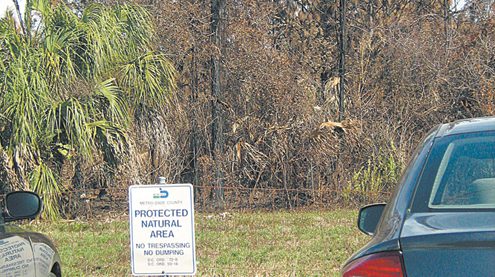 A brush fire swept over nearly one-third of a 30-acre pine rockland preserve in West Kendall in the early morning of Jan. 31, once again calling attention to a rare and diminishing South Florida environment.
A brush fire swept over nearly one-third of a 30-acre pine rockland preserve in West Kendall in the early morning of Jan. 31, once again calling attention to a rare and diminishing South Florida environment.
The fire that threatened adjoining residential areas along SW 112th Street and 142nd Avenue left 50- to 60-foot high native pines with limbs and foliage scorched rusty brown and black.
The pine rockland adjoins the former Camp Matecumbe that became an education center for disadvantaged youth before being taken over in 2009-10 by the Miami-Dade Parks Department for future development, currently stalled by economic belt-tightening.
Two firefighters, among 60 summoned to the blaze, were treated for smoke inhalation but no other injuries occurred at the pine rockland that adjoins the camp area, once known as Boystown of Florida and a former home for Cuba’s Pedro Pan refugees in the 1960s.
The blaze was spread by 15-mile-perhour winds, forcing temporary closure of Our Lady of Lourdes Catholic Elementary School.
An estimated 700 area homes suffered power loss when Florida Power & Light was asked for a temporary outage, according to a Miami-Dade Fire-Rescue Department spokesperson whose report added that officials didn’t believe the fire was started intentionally.
Controlled burns of forested areas on the coastal Miami Rock Ridge actually help restore new growth, according to website documents posted by the Miami-Dade County Department of Environmental Resources Management.
A major portion of the former Camp Matecumbe off SW 120th Street, adjacent to the pineland preserve’s east boundary, has been planned to showcase the value of preserving existing rockland habitats throughout Miami-Dade County.
The 2009-10 development plan calls for reforestation of the pine rockland near the Camp Matecumbe site, using the surrounding preserve as a model for its reestablishment. Apine rockland preserve trail system and a designated area for overnight camping, including location of four cabins, are included in the proposal.
“Current budget cutbacks have to put the Camp Matecumbe program on the shelf for now,” said Joe Webb, Planning Section supervisor for the Parks Department. “A variety of funding programs were looked into but none worked out. To help maintain the camp area, we had a staff cleanup day last year and will probably schedule another this year.
” The limestone rock outcroppings forming Miami-Dade County’s preserves extend south and west from North Miami Beach to Long Pine Key in Everglades National Park and are known for primarily 225 types of native plants, nearly one-fifth found nowhere else in the world.
Pine rocklands once covered 185,000 acres of Miami-Dade County but by the time Miami marked its 100th anniversary in 1996, only 2 percent of the pine forest remained within the urbanized areas of the county and outside Everglades National Park, the rest broken into fragments like those in heavily suburbanized West Kendall.







Comments are closed.